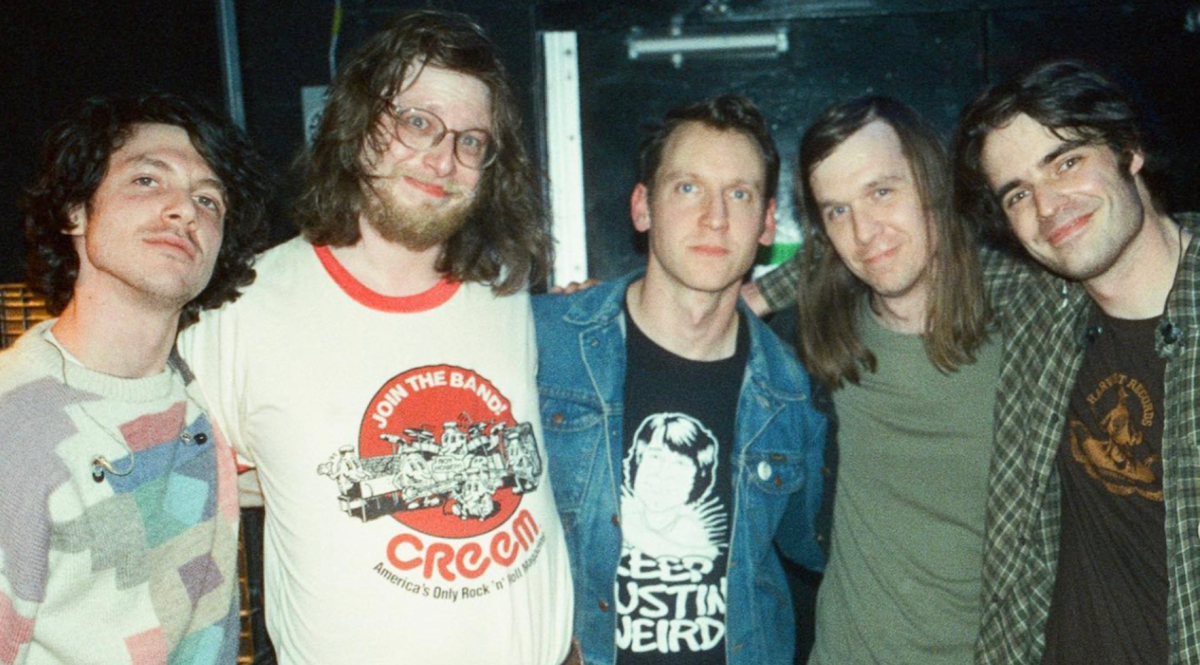On Sept. 22, the Philadelphia-based indie rock band, Slaughter Beach, Dog released their long awaited fifth studio album, “Crying, Laughing, Waving, Smiling” via Lame-O Records. Jake Ewald, singer-songwriting frontman of the alternative/indie rock band, pours out his heart once again in the confessional new album. Blending intricate lyrical narratives and tranquil melodic soundscapes, Slaughter Beach, Dog takes listeners on an emotionally diverse, summer-inspired journey.
“Not a poet, not even close,” Ewald sings in the first lines of the album. It’s an overtly modest statement from the artist but, as any listener will soon be able to see, the proposition is far from the truth. Ewald juxtaposes his humble utterance with a showcase of meticulous rhyme schemes and poetic diction that complement his intricate narratives, enhancing his masterful storytelling.
Originally from Delaware, Ewald, a former member of alternative rock/emo band Modern Baseball, founded Slaughter Beach, Dog in 2014, just three years before Modern Baseball announced their indefinite hiatus in 2017. Following the band’s split, Ewald, along with Modern Baseball bassist Ian Farmer, began releasing songs under their new moniker, taking the name from the Delaware town of Slaughter Beach.
Attempting to branch away from their last band’s juvenile lyrics and angsty teenage confessionals, Ewald embarked on a solo endeavor to develop a new look for him and his new band. Slaughter Beach, Dog served as a new creative outlet and a way to combat the writer’s block he experienced in Modern Baseball.
With each new album, Ewald’s confidence grows. A notable increase of maturity is present in his lyrics as he distances himself from his melodramatic teenage roots. And with the recent release of the band’s fifth studio album, it is undeniable that Ewald has never sounded further away, both lyrically and atmospherically, from Modern Baseball.
Beginning with “Surfin’ New Jersey,” Ewald embarks on a lyrical journey across the Mideast, referencing locations such as New Jersey and Delaware. The repetitive acoustic guitar melody, shuffling drumbeat, contrasted by droning vocal hums and spacey electric guitar produces a hypnotic effect, atmospherically evoking feelings of care-free summer afternoons. “Shirtless in a silver sudan / air rollin’ in” followed by lyrics such as “falling asleep in the sun,” paired with Jake’s monotonous, almost tired voice is evocative of lazy, hot summer days.
The album picks up the pace as it dives into two of the lead singles from the record “Strange Weather,” and “Float Away.” These tunes may feel more familiar to well-versed Slaughter Beach, Dog enthusiasts. “Strange Weather” stays on-brand with one of Ewald’s songwriting trademarks: happy sounding songs with sad lyrics. Don’t let the melodies fool you with this one, “Sha-la-la, oh my word / How am I still unsure? / I don’t want to think about you anymore.” Ewald regretfully expresses his desire to forget an ex-lover through upbeat guitar melodies and grooving drumbeats.
“Mama don’t raise no fools here / We got to rely on each other my dear,” Ewald sings in the chorus of the next track “My Sister in Jesus Christ.” Staccato piano chords frame Ewald’s playful lyrics in this light-hearted ode to his twin sister. This song grapples with religious and familial values as he recalls memories of growing up and missing church on Sunday mornings.
In a song that captures the essence of the album, “Summer Windows,” Jake describes his loneliness, as he expresses a longing for company. As the name of the song suggests, “Summer Windows” feels like a warm summer breeze entering through the windows, blanketing the listener in peaceful, pleasant acoustic melodies and warm tonal harmonies.
However, Ewald’s storytelling feels muddled at times as he embarks on long-winded, convoluted narratives that are oftentimes difficult to follow. His poetry gets lost in a sea of predictable, uniform melodies. Ewald’s droning voice feels indifferent, giving an overwhelming sense of despondence that may ultimately alienate the listener. This is most evident on tracks such as “Bobcat Club,” “Tommy” and “Henry” that lack any standout quality on this even-tempered album, resulting in songs that fall flat compared to the album’s highlights.
“When they sold that van / outside of my house / there was a part of me tied to the engine / maybe I was the engine,” begins, perhaps the most thought-provoking track on the album. The nearly nine-minute long epic, “Engine,” seamlessly blends mundane imagery with profound, larger-than-life ideas. “Maybe let’s watch the Sopranos / Maybe let’s order Chinese,” Ewald intimately sings, as if the listener were right there next to him. The lyrics end with Ewald’s confessional proclamation, “The truth is I live to roll over,” leaving the listener to sit with this unsettling statement before the song launches into a 3-minute-long outro of fuzzy guitars and studio feedback sounds.
The album concludes with “Easter.” Ewald taps into his falsetto register in this sweet, lullaby-like tune, coating the listener in rich angelic harmonies. This bright, hopeful tune feels reassuring, inviting the listener back for more as the end draws near. It’s a suitably sweet ending to an album that, while uneven, wows with laid-back melodies and occasionally cutting lyrics.




















